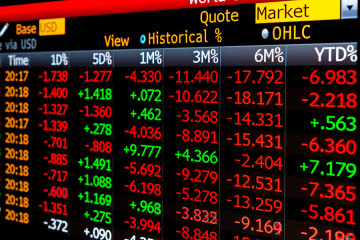Bloomberg Business: Oracle Sales Miss Estimates; Shares Rise on Cloud Gain
©2015 Bloomberg News
NLDPBF6JTSEC
(Bloomberg) — Oracle Corp. reported fiscal third-quarter sales that missed analysts’ estimates, hurt by a rise in the U.S. dollar and weak corporate demand for cloud software.
Revenue in the period that ended Feb. 28 was little changed from a year earlier at $9.33 billion, and profit before certain costs was 68 cents a share, the Redwood City, California-based company said Tuesday in a statement. On average, analysts projected $9.47 billion in sales and profit of 68 cents, according to data compiled by Bloomberg. Without the effect of the stronger dollar, revenue would have gained 6 percent, Oracle said, sparking optimism that the company is making headway with its push into corporate cloud services and sending the shares up in extended trading. In recent years, Oracle had been lagging behind rivals like Salesforce.com Inc. and Workday Inc. in delivering business software and services via the Internet. “It might have just been a sense of relief,” said Dan Morgan, a senior portfolio manager at Synovus Securities Inc., which owns 1.17 million Oracle shares. “We know they’re making the transition. At least we didn’t get the software licensing piece to drop way off.”
Dividend Boost
The software maker also boosted its dividend by 25 percent to 15 cents a share, up from the prior payout of 12 cents. The company last raised its dividend in 2013, according to data compiled by Bloomberg. Oracle shares rose 3.4 percent in late trading following the report and dividend increase. The stock fell 1.2 percent to $42.87 at the close in New York, leaving it down 4.7 percent this year. Third-quarter net income fell to $2.5 billion, or 56 cents a share, from $2.57 billion, or 56 cents, a year earlier. Oracle makes databases and other software that helps corporations store, sort, manage and analyze large amounts of digital information. Co-Chief Executive Officer Safra Catz said on last quarter’s conference call that volatility in the currency markets might adversely affect Oracle’s revenue by 4 percent and profit by 4 cents a share. The U.S. Dollar Index, which tracks the greenback against six major currencies, has gained about 10 percent so far this year.
“The FX thing has been the black cloud on the whole market,” Morgan said. In Oracle’s last full fiscal year, 56 percent of revenue came from overseas, according to data compiled by Bloomberg.
Foreign Exchange
Foreign-exchange fluctuations have also hit other large multinational technology firms, including International Business Machines Corp. and Hewlett-Packard Co. Both reduced forecasts because of the stronger U.S. currency, which means overseas sales translate into fewer dollars when brought back home. This quarter marked the second period with co-CEOs Catz and Mark Hurd at the helm of the company, following Larry Ellison stepping down as CEO in September to become chief technology officer and chairman. Oracle is in the process of shifting more of its business to the cloud, meaning it has to sacrifice some lucrative installable software sales for subscription-based cloud sales — which eventually could help boost profit margins. It is also facing greater competition in the market for corporate data- center hardware, and it announced in January that it would cut the prices of some of these products to gain customers and pose a bigger challenge to companies such as Cisco Systems Inc. and EMC Corp.
To contact the reporter on this story: Jack Clark in San Francisco at jclark185@bloomberg.net To contact the editors responsible for this story: Jillian Ward at jward56@bloomberg.net Tony Robinson







No Comment